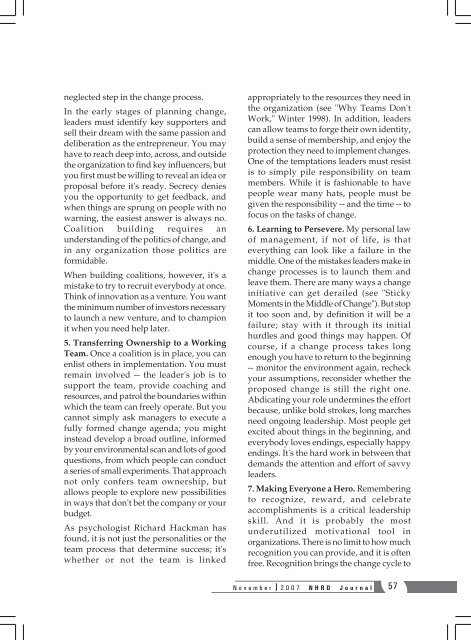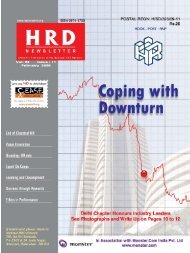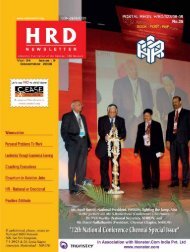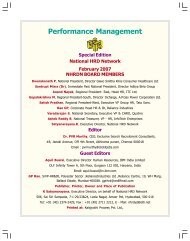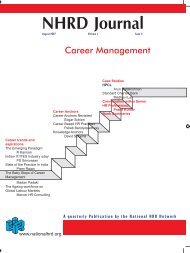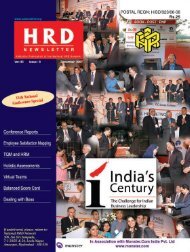NHRD Journal - National HRD Network
NHRD Journal - National HRD Network
NHRD Journal - National HRD Network
You also want an ePaper? Increase the reach of your titles
YUMPU automatically turns print PDFs into web optimized ePapers that Google loves.
neglected step in the change process.<br />
In the early stages of planning change,<br />
leaders must identify key supporters and<br />
sell their dream with the same passion and<br />
deliberation as the entrepreneur. You may<br />
have to reach deep into, across, and outside<br />
the organization to find key influencers, but<br />
you first must be willing to reveal an idea or<br />
proposal before it's ready. Secrecy denies<br />
you the opportunity to get feedback, and<br />
when things are sprung on people with no<br />
warning, the easiest answer is always no.<br />
Coalition building requires an<br />
understanding of the politics of change, and<br />
in any organization those politics are<br />
formidable.<br />
When building coalitions, however, it's a<br />
mistake to try to recruit everybody at once.<br />
Think of innovation as a venture. You want<br />
the minimum number of investors necessary<br />
to launch a new venture, and to champion<br />
it when you need help later.<br />
5. Transferring Ownership to a Working<br />
Team. Once a coalition is in place, you can<br />
enlist others in implementation. You must<br />
remain involved -- the leader's job is to<br />
support the team, provide coaching and<br />
resources, and patrol the boundaries within<br />
which the team can freely operate. But you<br />
cannot simply ask managers to execute a<br />
fully formed change agenda; you might<br />
instead develop a broad outline, informed<br />
by your environmental scan and lots of good<br />
questions, from which people can conduct<br />
a series of small experiments. That approach<br />
not only confers team ownership, but<br />
allows people to explore new possibilities<br />
in ways that don't bet the company or your<br />
budget.<br />
As psychologist Richard Hackman has<br />
found, it is not just the personalities or the<br />
team process that determine success; it's<br />
whether or not the team is linked<br />
appropriately to the resources they need in<br />
the organization (see "Why Teams Don't<br />
Work," Winter 1998). In addition, leaders<br />
can allow teams to forge their own identity,<br />
build a sense of membership, and enjoy the<br />
protection they need to implement changes.<br />
One of the temptations leaders must resist<br />
is to simply pile responsibility on team<br />
members. While it is fashionable to have<br />
people wear many hats, people must be<br />
given the responsibility -- and the time -- to<br />
focus on the tasks of change.<br />
6. Learning to Persevere. My personal law<br />
of management, if not of life, is that<br />
everything can look like a failure in the<br />
middle. One of the mistakes leaders make in<br />
change processes is to launch them and<br />
leave them. There are many ways a change<br />
initiative can get derailed (see "Sticky<br />
Moments in the Middle of Change"). But stop<br />
it too soon and, by definition it will be a<br />
failure; stay with it through its initial<br />
hurdles and good things may happen. Of<br />
course, if a change process takes long<br />
enough you have to return to the beginning<br />
-- monitor the environment again, recheck<br />
your assumptions, reconsider whether the<br />
proposed change is still the right one.<br />
Abdicating your role undermines the effort<br />
because, unlike bold strokes, long marches<br />
need ongoing leadership. Most people get<br />
excited about things in the beginning, and<br />
everybody loves endings, especially happy<br />
endings. It's the hard work in between that<br />
demands the attention and effort of savvy<br />
leaders.<br />
7. Making Everyone a Hero. Remembering<br />
to recognize, reward, and celebrate<br />
accomplishments is a critical leadership<br />
skill. And it is probably the most<br />
underutilized motivational tool in<br />
organizations. There is no limit to how much<br />
recognition you can provide, and it is often<br />
free. Recognition brings the change cycle to<br />
November 2007 <strong>N<strong>HRD</strong></strong> <strong>Journal</strong> 57


